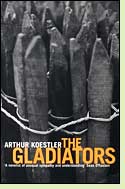The Gladiators
by Arthur Koestler
Reviewed by David Maclaine

Learning that the author of The Gladiators was the same Arthur Koestler whose books I first encountered in college came as a pleasant surprise. Why would the author of Darkness at Noon, a harrowing novel about the famous Stalinist show trials in which the Soviet state devoured assorted leaders of the revolution that had brought it into being, and The Sleepwalkers, a nonfiction account of the mysterious forces at work in the minds of the men who transformed our understanding of the solar system, tackle the subject of the slave revolt led by Spartacus? The answer arrives quickly; Koestler was clearly fascinated by the psychology of revolutions, and The Gladiators shows the great slave revolt from the perspectives of an assortment of characters drawn into it for very different reasons. The novel includes plenty of action, but a great deal more discussion between characters about just what they hope to accomplish. Koestler's interest in the way mass movements escape control of their purported leaders is especially pronounced in his account of the rebels' attempt to build their ideal city, and the forces that doom their efforts.
You will learn nothing new about gladiators from reading
this book, because their revolt begins at the beginning of the novel. The Gladiators offers a well-written
account of Spartacus' rebellion, but the real focus of the story is the various
ways humans who discover their world is on the brink of change respond to that
discovery. Why do men and women decide to join or resist a revolution? Do those
who take part understand own reasons for acting? Just how much power do the
"leaders" have when a mass movement gathers momentum? If you believe ancient
revolts can tell us something about ourselves that transcends those distant
times, this is a novel you'll want to read. (1939, 398 pages)
The Gladiators appears on the list of The 50 Best Historical Novels for a Survey of Ancient Roman History
Other novels about the Spartacan rebellion:
Spartacus by Howard Fast (1951), the basis for Stanley Kubrick's 1960 film. More info
Spartacus: The Gladiator by Ben Kane (2012), about Spartacus and his leadership of the slave revolt against Rome; a sequel, Spartacus: Rebellion continues the story. More info
Arms of Nemesis by Steven Saylor (1992), a mystery about a murder during the Spartacan slave revolt, which stirs tension between Roman slaves and their masters; #2 in the Roma Sub Rosa mystery series. More info
Nonfiction about the Spartacan rebellion:
The Spartacus War by Barry Strauss (2009). More info
Spartacus and the Slave Wars: A Brief History with Documents by Brent D. Shaw (2001). More info
Slavery and Rebellion in the Roman World, 140 B.C. - 70 B.C. by Keith R. Bradley (1989). More info
At the Movies:
Spartacus
Online:
Spartacus at Wikipedia
Back to Novels of Ancient History
Back to Directory of Book Reviews